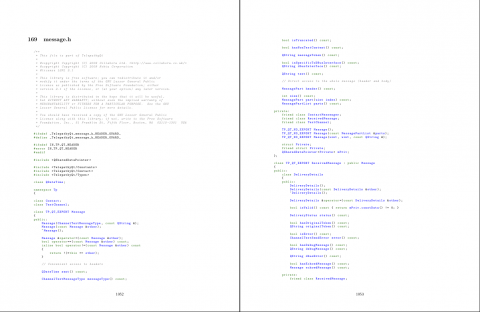
- Let's discuss some of the best open source PDF editors available online, along with the pros and cons of each one. Top 5 Open Source PDF Editors for Windows 1. LibreOffice Draw PDF editor LibreOffice is a strong competitor in the world of PDF editing. It is a free and oen source software much like MS Office.
- Free PHP Source Code. Download from a vast collections of free PHP source code below. You can modify and integrate it in your own personal use. Just give a little credit to the original author whenever you use it on your system's project.
- SumatraPDF Reader. SumatraPDF is a multi-format (PDF, EPUB, MOBI, FB2, CHM, XPS, DjVu) reader for Windows under (A)GPLv3 license, with some code under BSD license (see AUTHORS).
For years, the only name in the game for working with PDF documents was Adobe Acrobat, whether in the form of their free reader edition or one of their paid editions for PDF creation and editing. But today, there are numerous open source PDF applications which have chipped away at this market dominance.
OpenPDF is a Java library for creating and editing PDF files with a LGPL and MPL open source license. OpenPDF is the LGPL/MPL open source successor of iText, and is based on a fork, of a fork, of iText 4 svn tag. We welcome contributions from other developers. Please feel free to submit pull-requests and bugreports to this GitHub repository.
OpenPDF version 1.3.11 released 2019-09-19
Get version 1.3.11 here - https://github.com/LibrePDF/OpenPDF/releases/tag/1.3.11
Use OpenPDF as Maven dependency
Add this to your pom.xml file to use the latest version of OpenPDF:
See Pdf Source Code
License
GNU General Lesser Public License (LGPL) version 3.0 - http://www.gnu.org/licenses/lgpl.html
Mozilla Public License Version 2.0 - http://www.mozilla.org/MPL/2.0/
We want OpenPDF to consist of source code which is consistently licensed with the LGPL and MPL licences only. This also means that any new contributions to the project must have a dual LGPL and MPL license only.
Documentation
- Tutorial (wiki, work in progress)
Background
Pdf File Source Code
OpenPDF is open source software with a LGPL and MPL license. It is a fork of iText version 4, more specifically iText svn tag 4.2.0, which was hosted publicly on sourceforge with LGPL and MPL license headers in the source code, and lgpl and mpl license documents in the svn repository.Beginning with version 5.0 of iText, the developers have moved to the AGPL to improve their ability to sell commercial licenses.
Projects using OpenPDF
- Spring Framework https://github.com/spring-projects/spring-framework
- flyingsaucer https://github.com/flyingsaucerproject/flyingsaucer
- Confluence PDF Export
- Digital Signature Service - https://github.com/esig/dss
- OpenCMS, Nuxeo Web Framework, QR Invoice Library and many closed source commercial applications as well.
- Full list here: https://mvnrepository.com/artifact/com.github.librepdf/openpdf/usages
Android support
OpenPDF now has Android support, more info here: Android-support
Contributing
Release the hounds! Please send all pull requests.Make sure that your contributions can be released with a dual LGPL and MPL license. In particular, pull requests to the OpenPDF project must only contain code that you have written yourself. GPL or AGPL licensed code will not be acceptable.
Coding Style
- Code indentation style is 4 spaces.
- Generally try to preserve the coding style in the file you are modifying.
Dependencies
Required Dependencies:
- Java 8 or later is required to use OpenPDF. All versions Java 8 to Java 12 have been tested to work.
Optional:
- BouncyCastle (BouncyCastle is used to sign PDF files, so it's a recommended dependency)
- Provider
- PKIX/CMS
- TwelveMonkeys imageio-tiff - optional by default, but required if TIFF image support is needed.
- JUnit 5 - for unit testing
- JFreeChart - for testing graphical examples
- JFreeChart
- JCommon
- Servlet
- DOM4j is required for the pdf-swing submodule.
Credits
Significant Contributors to OpenPDF on GitHub:
@andreasrosdal - Andreas Røsdal - Maintainer of OpenPDF from 1.0 to 1.3.11, now retired from OpenPDF development.
@daviddurand - David G. Durand
@tlxtellef - Tellef
@asturio
@ymasory
@albfernandez - Alberto Fernández
@noavarice
@bengolder - Benjamin Golder
@glarfs
@Kindrat
@syakovyn
@ubermichael - Michael Joyce
@weiyeh
@SuperPat45
@lapo-luchini
@MartinKocour - Martin Kocour
@jokimaki
@sullis
@lapo-luchini
@jeffrey-easyesi
@V-F
@sixdouglas
@razilein - Sita Geßner
@PalAditya - Aditya Pal
Also, a very special thanks to the iText developers ;)